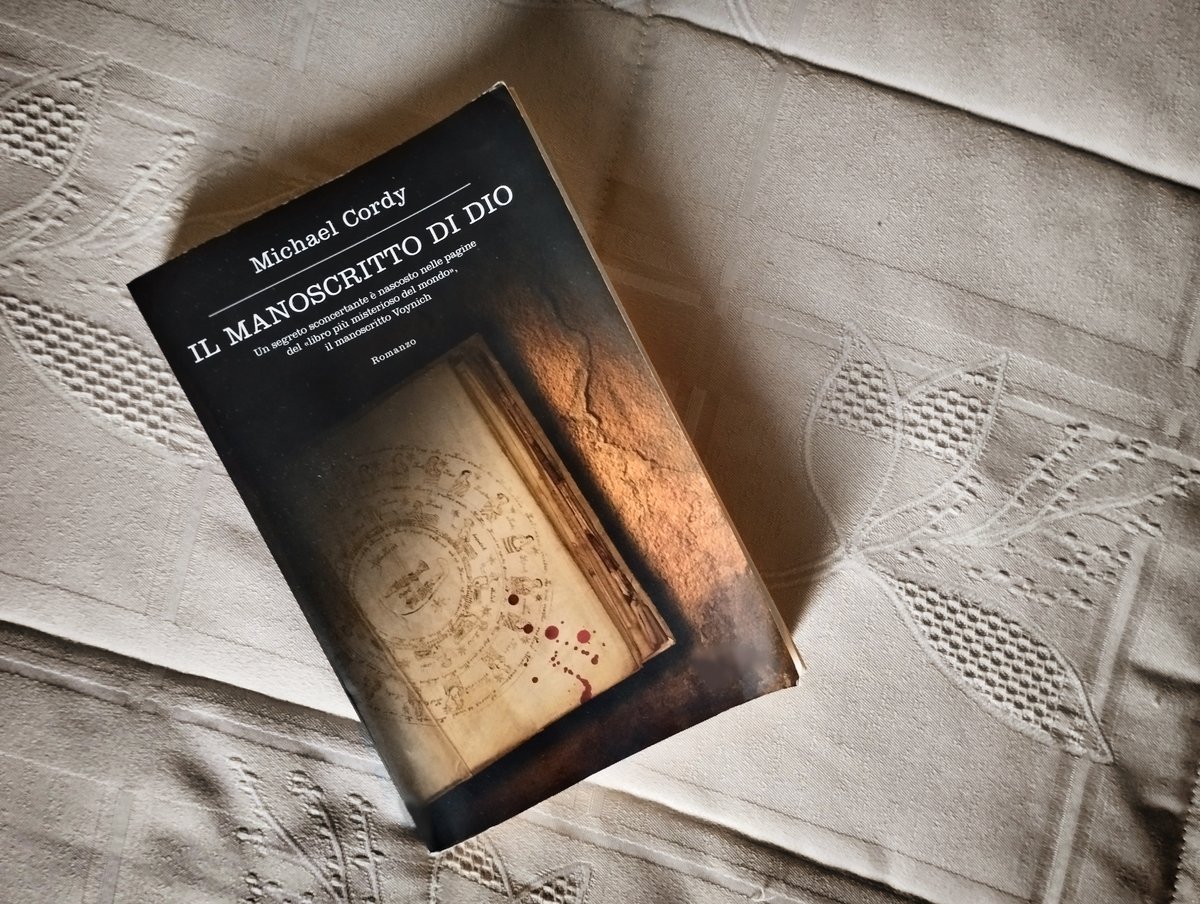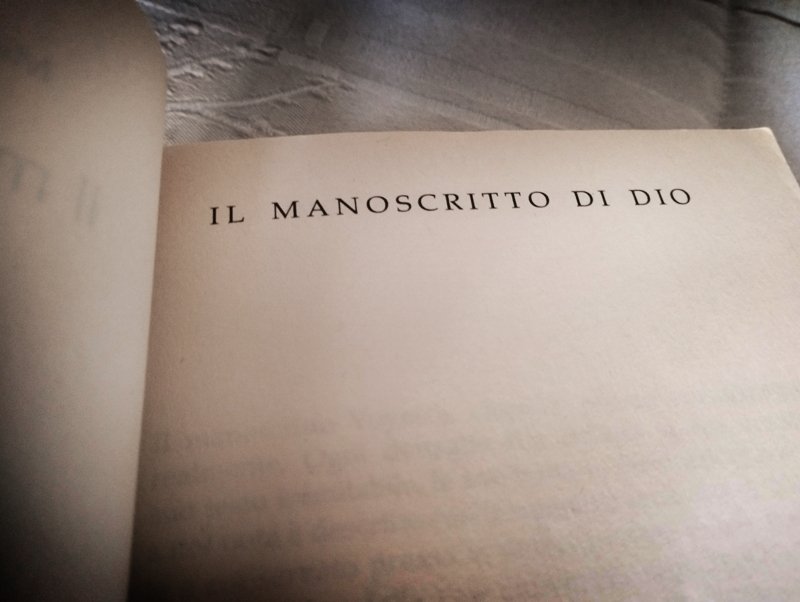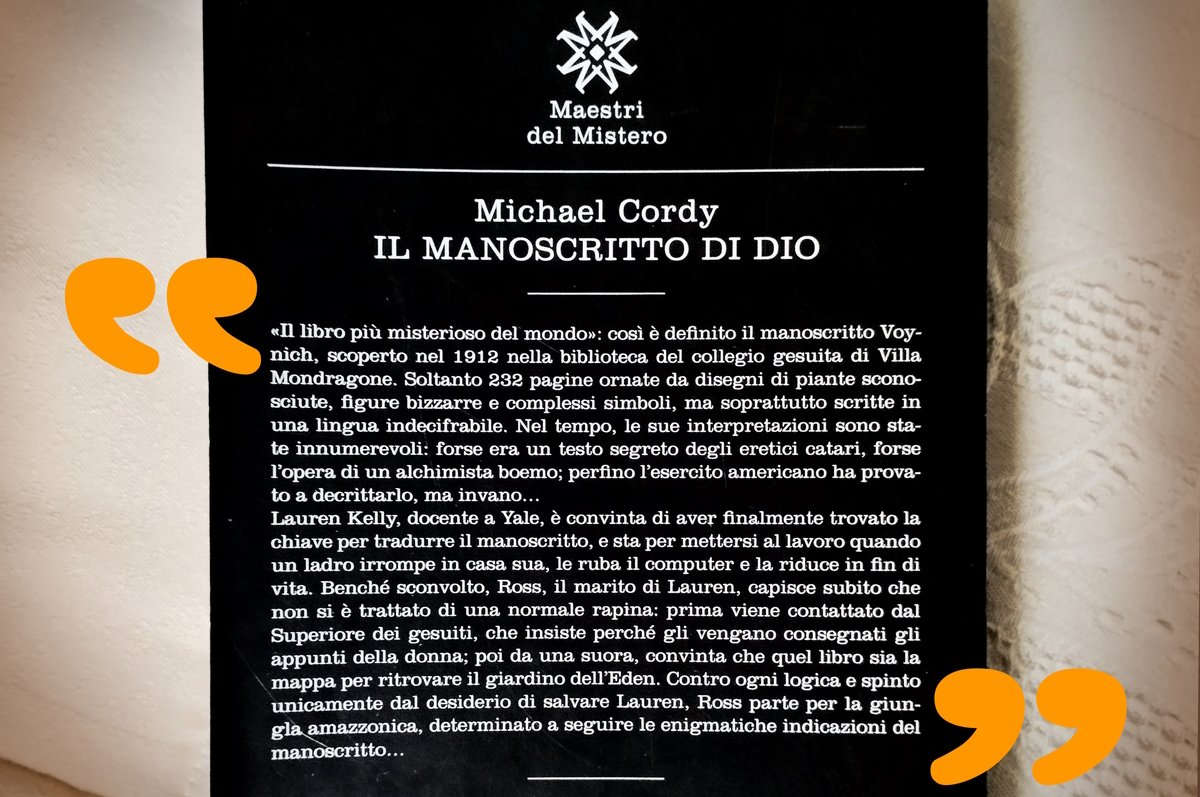Non è consentito l'uso dei contenuti presenti in questo post – e/o di ogni loro derivato – senza esplicito consenso dell'autore, a eccezione della diffusione senza modifiche attraverso canali media e social media.
Questo post non ha finalità promozionale.

Ciao!
Oggi pubblico un post inerente la mia iniziativa #lobook. In breve, in questa rubrica condivido la mia esperienza riguardo a un libro, iniziando dall'acquisto e terminando con la mia personale recensione. Puoi trovare qualcosa in più sull'argomento lobook, consultando il mio primo post Lobook qui su Steemit.
E ORA INIZIAMO!
Questo nuovo episodio prende ispirazione dal romanzo di Michael Cordy, pubblicato con il titolo The Source (2008). La traduzione italiana che io ho letto è Il Manoscritto di Dio, curata da Velia Februari. La prima pubblicazione in Italia risale al 2008. Nell'immagine sottostante, puoi trovare un'immagine con la copertina da cui ho rimosso alcune parti, provando a evitare possibili pubblicità dirette.

E qui sotto, ecco alcuni scorci delle pagine all'interno:


Ho acquistato il libro diversi anni fa in formato tascabile. Ci sono più edizioni disponibili dal prezzo differente, maggiori per le versioni in copertina rigida e minori per quelle a copertina morbida. A oggi, è un romanzo abbastanza difficile da reperire. Il primo prezzo che ho trovato navigando sul web qui in Italia è di circa €6,00 per i libri usati, fino a €18,50 per le edizioni in copertina rigida.

SFOGLIANDO LE PAGINE
È il Cinquecento: un atroce sofferenza prima di morire, ucciso per mantenere il segreto che un giorno verrà rivelato. Cinque secoli più tardi, finalmente il manoscritto più misterioso del mondo è stato tradotto: il Manoscritto Voynich, una delle reliquie rimaste insondabili per così tanto tempo. Ma più di una misteriosa mano s'insinua tra gli eventi, decisa a rincorrere i propri obbiettivi riguardo al manoscritto di Satana e alla ricerca di un luogo segreto dove ogni miracolo è possibile.
Questo è l'unico libro di Michael Cordy che ho letto. Lo stile di scrittura è abbastanza semplice, e anche le ambientazioni sono relativamente facili da immaginare. Forse non troppo particolareggiate, ma abbastanza da rendere l'idea (con un po' di fantasia). Anche la trama è abbastanza semplice. Per me è risultata facile da seguire, sebbene pensi che in alcune parti l'autore si sia dilungato più del necessario: questa è una pecca che forse non può nemmeno definirsi più tale, essendo presente in quasi tutti i romanzi che superano le 350 pagine. I personaggi non vengono forse caratterizzati troppo, ma anche in questo caso un po' di fantasia da parte del lettore aiuta a dargli una veste accettabile.
Il punto focale di questo romanzo – quello per cui un lettore dovrebbe decidere se comprarlo oppure no – è certamente la trama. La scrittura non è troppo creativa, le frasi vengono maneggiate in maniera abbastanza accademica, sebbene fluida e utile per seguire le vicende. Il filo conduttore si può inquadrare a metà tra azione/avventura e thriller. È uno di quei romanzi in cui però subentra un lato prettamente fantastico, diversamente dai thriller del genere crime. Diciamo un romanzo alla Dan Brown, alla James Rollins, o alla Glenn Cooper. Mistero, avventura, azione, suspense: c'è un po' di tutto. Non mi sento di fare paragoni con altri autori per quanto riguarda la scrittura, lascio invece giudicare a te. Nel complesso, il libro mi è piaciuto.
Pagine: 433
Genere: Mistery, Fantasy, Thriller, Spionaggio

Qui sotto trovi anche un'anteprima del retro della copertina, dove puoi vedere una breve descrizione del libro.

VALUTAZIONE PERSONALE
Per la mia personale valutazione del libro, uso di solito due tipi di voto: un VOTO GENERALE, basato su un approccio più obiettivo al testo (dove considero per esempio il modo di scrivere dell'autore, la trama, gli errori riscontrati, eccetera), e un VOTO COINVOLGIMENTO, basato invece sulle sensazioni che mi ha trasmesso (se mi ha attratto, se mi ha intrigato e invogliato nella lettura, se mi ha lasciato informazioni utili, eccetera). Ognuno dei due voti viene contrassegnato da un numero di stelle che va dal minimo di 1 al massimo di 5.
Nel caso de Il manoscritto di Dio, il mio personale responso è
- Voto generale: 3 stelle
- Voto coinvolgimento: 4 stelle

Se questo articolo ti ha incuriosito, puoi trovare info cercando online notizie dell'autore, oppure rivolgerti a rivenditori del settore. Io ti saluto e spero di averti lasciato un'opinione utile. Periodicamente pubblicherò altri articoli di questo genere. Se ti interessa scoprire nuovi libri sul mercato – principalmente romanzi –, puoi continuare a seguirmi sul tag #lobook.
Un saluto e al prossimo libro!

Questo post partecipa al progetto sperimentale Penny4thoughts.
Below, the ENGLISH translation I previously published on Blurt.
Every use of the contents herein - and/or each derivative - is prohibited without the explicit consent of the author, except for dissemination without modification trough media and social media channels.
This post doesn't have a promotional purpose.

Hello!
Today I publish a post about my #lobook initiative. Here, I share my experience about a book, beginning from the buying and finishing with my personal review. You can read more about lobook, consulting my first Lobook post here on Steemit.
AND NOW, LET'S GO!
This new episode takes a cue from the Michael Cordy's novel, published with the title The Source (2008). The Italian translation I read is Il Manoscritto di Dio, curated by Velia Februari. The first publication in Italy dated back to 2008. In the image below, you can see a cover picture from which I removed a few parts, trying to avoid possible direct advertisings.

And below, some slices of the inner pages:


I bought the book several years ago in paperback format. There are multiple editions with different prices, major for the hard-cover version and minor for the softcover one. Nowaday, it is a quite-difficult-to-find novel. The first price I found surfing the web here in Italy is 6,00€ about for the used books, up to the 18,50€ for the hard-cover edition.

TURNING PAGES
It is the sixteenth century: a terrible suffering before dying, killed to keep the secret that will be revealed one day. Five centuries later, the world's most mysterious manuscript has finally been translated: the Voynich Manuscript, one of the relics that remained unfathomable for so long. But more than one mysterious hand creeps between the events, determined to chase their goals regarding the manuscript of Satan and looking for a secret place where every miracle is possible.
This is the only Michael Cordy book I have read. The writing style is quite simple, and the settings are also relatively easy to imagine. Perhaps not too detailed, but enough to make the idea (with a little imagination). The plot is also quite simple. For me, it was easy to follow, although I think that in some parts the author has gone on longer than necessary: this is a flaw that perhaps can't even be defined as such anymore, because I find it in almost all novels that exceed 350 pages. The characters are perhaps not drawn too much, but, even in this case, a little imagination on the part of the reader helps to give them an acceptable appearance.
The focal point of this novel - the one for which a reader should decide whether to buy it or not - is certainly the plot. The writing is not too creative, and the sentences are handled in a fairly academic way, although fluid and useful for following the events. The common thread can be framed halfway between action/adventure and thriller. It is one of those novels in which, however, a purely fantastic side takes over, unlike crime thrillers. Let's say a Dan Brown, James Rollins, or Glenn Cooper novel. Mystery, adventure, action, suspense - there's a little bit of everything. I don't feel like making comparisons with other authors as far as writing is concerned. Instead, I leave it up to you to judge. Overall, I liked the book.
Pages: 433
Genre: Mistery, Fantasy, Thriller, Spy-story

PERSONAL RATING
For my personal rating of the book, I usually use two votes: a GENERAL VOTE, based on a more objective approach to the text (where I consider for example the author's way of writing, the plot, any errors found, etc), and an INVOLVEMENT VOTE, based instead on the effect that reading had on me (if it attracted me, if it intrigued and tempted me, if it gave me useful information, etc.). Each of the two ratings is marked with a number of stars, from one to 5.
In the case of Il Manoscritto di Dio, my personal responses are:
- 3 stars for the general vote
- 4 stars for the involvement vote.

If this article has intrigued you, you can find info by searching on the web for news of the author, or contacting retailers in the books business sector. I greet you, and I hope my one is a useful opinion. I will periodically publish other posts of this kind. If you are interested in discovering new books – mainly novels – on the market, you can continue following me on the #lobook tag.
A greeting and to the next book!

This post join the Penny4thoughts experimental project.
